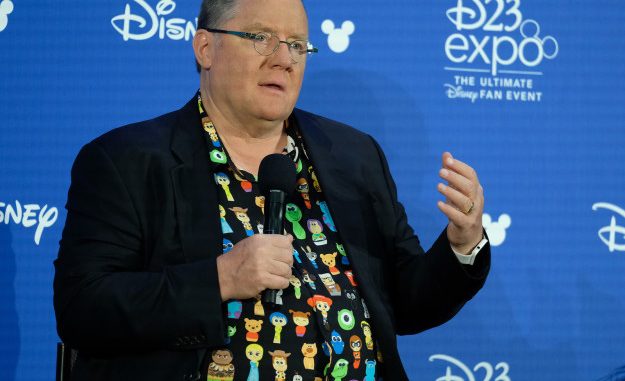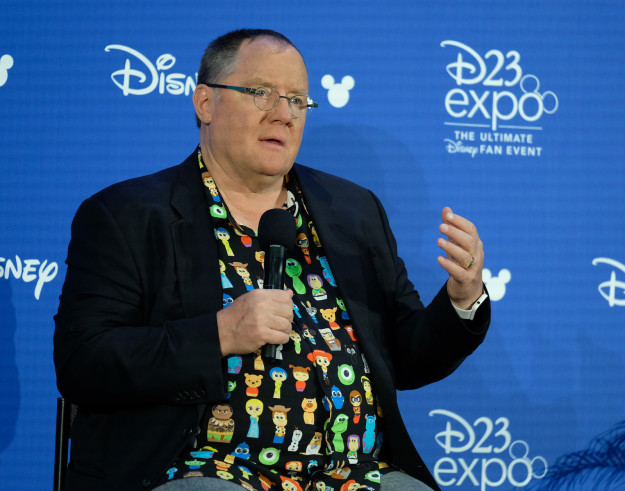

Chris Delmas / AFP / Getty Images
News broke Tuesday that Disney/Pixar’s chief John Lasseter was taking a six-month leave of absence because of “missteps.” Immediately following, reports in The Hollywood Reporter, Vanity Fair, and Variety revealed allegations of unwanted kissing, hugging, and touching of his female colleagues. In Los Angeles, women who work in TV animation told BuzzFeed News that although outsiders perceive animation is as a wholesome industry, sexual harassment is pervasive and has long gone unchecked.
“I don’t think that should come as a surprise to anybody who’s spent any time in animation,” said Ashley Long, a director who works on adult-oriented shows. “Abuse of power by men — I don’t want to say it’s part of the territory, because that makes it sound like you have to put up with it — but it’s extremely common.”
Lasseter’s departure, although temporary at the moment, followed the revelations of Harvey Weinstein’s decades of alleged sexual harassment and assault, which were first reported by the New York Times Oct. 5 and The New Yorker Oct. 10. The accusations against Weinstein spurred countless women and men to come forward with stories of their own experiences of harassment. Under heightened scrutiny, many prominent men, including some in animation, have been punished. “It was always the law, but suddenly people woke up and realized it’s the law,” Long said.
Still, it was unclear to the women who spoke with BuzzFeed News whether the surge of accountability for sexual harassment in the animation industry would lead to lasting change. Even publicly criticizing Lasseter, who has admitted to making his colleagues uncomfortable, was seen as risky by Elise Willis, a 29-year-old storyboard artist. Calling Lasseter “revered,” Willis was hesitant to be quoted, saying, “I’m still not 100% on using my name, because like I said, things are looking good now, shitty dudes are getting fired now, but I don’t know what it’s gonna be like in the future.” She then added, “The people that allowed his behavior to happen are still there.”
As Vanity Fair reported, Disney executives discussed Lasseter forcibly kissing and fondling a colleague at a party in 2010; the magazine’s source called him a “crazy-horny 13-year-old” they had to “keep in check,” but then went on to praise him as a “genius.” Willis was irritated by that thinking. “He can be replaced!” she said.
Disney did not immediately respond to a request for a comment Wednesday, but on Tuesday, they released a statement saying, “We are committed to maintaining an environment in which all employees are respected and empowered to do their best work. We appreciate John’s candor and sincere apology and fully support his sabbatical.” Lasseter’s representative did not immediately respond to a request for a comment.
Animation is a small industry, Long told BuzzFeed News, and there’s “fear” of formally reporting incidents or communicating discomfort with a colleague’s behavior: “You don’t want a bad reputation,” she said. “As a woman, the feeling is you want to go in with absolutely no marks against you because you’re afraid that any little thing could give them an excuse to not hire you. … A lot of women are very afraid of being seen as troublemakers.”
Ashlyn Anstee, a 28-year-old storyboard artist, said that she’d reported verbal harassment by male colleagues at three of six jobs and was brushed off by producers. “A lot of producers are women,” she said. “Women making excuses for men. It’s a frustrating message for young women: If it bothers you, it’s because you’re not strong enough, or you don’t get the joke. … Because this is a boys’ industry, any woman is just kind of visiting, and the men are gonna keep doing what they’re doing and you have to be cool with it.” Younger women, she said, are challenging the status quo, but change has been slow.
Anstee found the term that many used to describe Lasseter’s reported unwanted hugging and kissing — “touchy-feely” — frustrating. The inherently sexual undertone of hugging a female colleague for too long, or kissing her, was obscured by “touchy-feely,” she said.
Marie Bower, a storyboard artist also in her twenties, told BuzzFeed News she was happy Lasseter’s behavior had “finally” resulted in consequences. Although Bower said she had never interacted with Lasseter directly during her brief time working at Disney in 2015, his unwanted touching was joked about in the workplace. Bower remembered a male colleague told her that Lasseter would sometimes go in for a kiss when he hugged women. Although that male colleague didn’t recall the exact conversation, he confirmed that Lasseter’s hugs and kisses in the workplace were openly gossiped about. Neither Lasseter nor Disney responded to a request for a comment on this.
“All of this was not hidden information,” Bower said. “The misogyny runs deep in animation, and a lot of it has gone unchecked because it’s been a boys’ club for so long.”
Bower was concerned by Lasseter’s memo — and, like Willis, she worried that Lasseter could still be forgiven. “It’s so weird that he’s like, ‘Oh, in six months, I’ll be back,’” Bower said. “Ugh, I hope not.”
If you have information or tips, you can contact this reporter at [email protected] or send us an encrypted message over Signal at (646) 379-1975. You can learn more about how to reach us here: contact.buzzfeed.com
LINK: Women Are Calling For An End To Sexual Harassment In The Animation Industry

